Tell me about a time when you had to provide primary care for a neonate, including routine assessments and emergency interventions.
INTERMEDIATE LEVEL

Sample answer to the question:
During my time working in a NICU, there was a particular case that stands out to me. I was responsible for providing primary care to a neonate who required routine assessments and emergency interventions. This baby was born prematurely and faced serious health challenges. I conducted routine assessments such as monitoring vital signs, conducting physical exams, and assessing the newborn's overall health. I also had to perform emergency interventions when necessary, such as administering medications, providing respiratory support, and coordinating with the neonatologist on call. It was a demanding and fast-paced environment, and I had to think critically and problem-solve on the spot. Despite the challenges, I developed a close rapport with the baby's family and provided them with emotional support and education on their infant's condition and care. Overall, it was a rewarding experience that allowed me to utilize my clinical skills and provide compassionate care to a vulnerable population.
Here is a more solid answer:
During my tenure as a Neonatal Nurse Practitioner in a Level III NICU, I encountered a complex case that required me to provide primary care for a neonate. The baby was born at 26 weeks gestation and faced multiple health issues, including respiratory distress syndrome and sepsis. As part of my routine assessments, I monitored the baby's vital signs, performed physical exams, and assessed their growth and development. In terms of emergency interventions, I was responsible for managing the baby's respiratory support, including administering surfactant and adjusting the ventilator settings as needed. I also collaborated with the multidisciplinary team, including neonatologists and respiratory therapists, to develop a comprehensive care plan for the baby. Communication was crucial in coordinating care and providing updates to the baby's family. I ensured that they were well-informed about their infant's condition, treatment plan, and progress. This required effective communication skills and empathy to provide emotional support during their challenging journey. Additionally, I utilized various medical equipment, such as incubators, phototherapy lights, and infusion pumps, with proficiency and adherence to safety protocols. Overall, this experience showcased my clinical skills, critical thinking, effective communication, and ability to adapt in a high-pressure environment.
Why is this a more solid answer?
The solid answer expands on the basic answer by providing specific details about the candidate's clinical skills and their ability to use medical equipment. It also highlights their communication and interpersonal skills and their ability to work as part of a multidisciplinary team. However, it could still provide more examples of the candidate's critical thinking and problem-solving abilities, as well as their emotional resilience and ability to cope with challenging situations.
An example of a exceptional answer:
Let me share with you an exceptional experience I had as a Neonatal Nurse Practitioner when I had to provide primary care for a high-risk neonate. This baby, born at 23 weeks gestation, had numerous health challenges, including chronic lung disease, intraventricular hemorrhage, and necrotizing enterocolitis. As part of my routine assessments, I conducted thorough physical exams, closely monitored the baby's vital signs, and interpreted diagnostic tests to assess their health status. During one particularly challenging shift, the baby's condition rapidly deteriorated, requiring immediate interventions. I had to think quickly and make critical decisions, coordinating with the neonatologists and respiratory therapists to provide aggressive respiratory support, including intubation and starting the baby on high-frequency ventilation. I also initiated total parenteral nutrition to support their nutrition needs and closely monitored their response to therapy. In addition to the medical complexities, I provided emotional support to the baby's parents, ensuring they were well-informed about their baby's condition and involving them in the decision-making process. This required empathy, strong communication skills, and the ability to remain calm in high-stress situations. Despite the challenging circumstances, the baby showed remarkable progress under our care and eventually transitioned to a lower level of care. This experience reinforced my passion for providing comprehensive and compassionate care to neonates in need.
Why is this an exceptional answer?
The exceptional answer goes above and beyond by providing a detailed and specific example of a highly challenging case the candidate faced as a Neonatal Nurse Practitioner. It showcases their clinical skills in managing complex neonatal conditions and their ability to make critical decisions in emergency situations. It also highlights their strong communication and interpersonal skills, as well as their emotional resilience in providing support to the baby's parents. The answer demonstrates their ability to cope with challenging situations and their dedication to providing quality care to neonates.
How to prepare for this question:
- Prepare examples of specific cases or experiences where you provided primary care for a neonate, including routine assessments and emergency interventions.
- Highlight your clinical skills in neonatal care and resuscitation, emphasizing your ability to manage complex conditions and provide appropriate interventions.
- Discuss your proficiency in using medical equipment relevant to neonatal intensive care, such as ventilators, incubators, and infusion pumps.
- Demonstrate your critical thinking and problem-solving abilities by sharing examples of situations where you had to make quick and informed decisions to ensure the well-being of the neonate.
- Share instances where you displayed emotional resilience and the ability to cope with challenging situations, emphasizing your empathy towards patients and their families.
- Practice effective communication skills, as working with families and multidisciplinary teams is a crucial aspect of the role.
What are interviewers evaluating with this question?
- Clinical skills in neonatal care and resuscitation
- Communication and interpersonal skills
- Proficiency in using medical equipment
- Critical thinking and problem-solving abilities
- Emotional resilience and ability to cope with challenging situations

